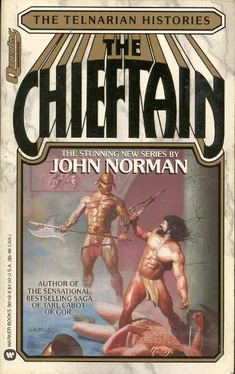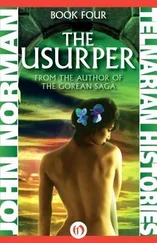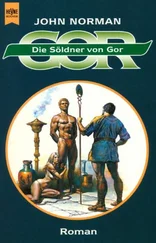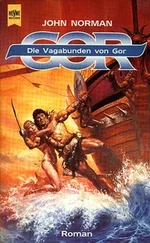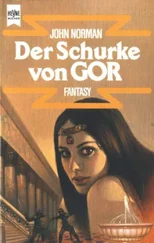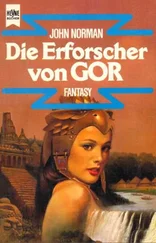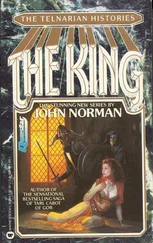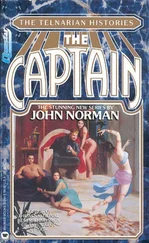The Chieftain
(The Telnarian Histories, Book 1)
by John Norman
This book is dedicated
to all who disapprove of blacklisting.
“In this year war was carried on with the Aatii.”
— The Annals.
The above entry is not untypical of the dark and troubled times to which I should like, in what follows, to devote my attention.
I suppose one might distinguish between history and chronicle, though the distinction must surely be one of grades, or shades, rather than of kinds, for there is seldom a history which does not clearly contain chronicle, nor a chronicle which does not, at least implicitly, recount a history.
We do not know, incidentally, who kept the Annals. Quite possibly they were set down by a succession of individuals, men who occupied remote, fortified places, places within which the most precious of the treasures of Telnaria might be kept safe, the ability to read and write.
“In this year war was carried on with the Aatii.”
This entry, with which I have begun, surely approximates to pure chronicle. There is doubtless an explanation for this. The men of the remote, fortified places had, for most practical purposes, turned their backs on history and the world. Such matters had little left in them to interest them. They had little to do with their studies, and the pursuit of their personal salvation, to assure which they may have withdrawn from the world. Also, they probably knew very little about the world they had left, perhaps some gossip, some remarks, picked up from merchants or traders. Yet they did keep the chronicles. Indeed, were it not for such sources we would know much less than we do about the dark and troubled times.
“In this year war was carried on with the Aatii.”
If one listens carefully, perhaps one can hear, beneath this laconic sentence, the ships, the roar of the engines, the bursting of the shells, the blare of trumpets, the hiss of weaponry, the running feet, the screams, even the clash of steel. Not all entries in the Annals, of course, are so terse. I have chosen this one because, you see, my story begins in the year referred to in this particular entry, the year, one of several, actually, in which war was carried on with the Aatii.
I have wondered sometimes why men tell stories. I suspect they have always done so. In the beginning perhaps they danced them, or drew them. A man is, after all, a story-telling animal. One needs no reason to tell a story, or to sing. Those are nice things about stories, and about singing. Perhaps the story, the song, like seeing, and thinking and breathing, if you like, is its own justification, its own reason.
I shall, in what follows, speak in simple, familiar terms, for these are the terms in the light of which we live and understand ourselves, and the worlds, both those without and those within. I shall ignore then the terrors of distance, the puzzles and paradoxes of time, her crevices, the clashing and grinding of her walls, the opening and closing, like the coming and going of tides, of her gates. Though these figure in our story they have little to do with it.
It is raining outside. Water runs down the casement. It gathers on the sill.
I think the vastness of it is what is most frightening. Perhaps, in the corner of some droplet of water, perhaps even one at hand, one lingering on the sill of the casement, some tiny, infinitesimal creature, one in which has just arisen the first glimmering of consciousness, trembles at the awesomeness of his universe. And perhaps we, ourselves, and all our time and space, and our history, and all the vastness of our own universe, those plenitudes before which we tremble, lie only upon another sill, inhabiting merely another droplet, somewhere. But the magnitude of man is not measured in the quantity of his being, that he lingers for such and such a time in such and such a place, a small time, in a small place, or that his frame contains so many cubits or less, but in his heart and soul, as tiny, as foul and dark as they may be. He, in his tiny place and time, may do deeds, and in these deeds he stands among the loftiest, farthest of stars. A smile, a gesture, an upraised fist, a laugh, a song, with these things, seemingly so small in themselves, he exceeds dimensions, he challenges all time and space.
Greatness, you see, is not measured in size. The magnitude of man is not measured in cubits.
We must understand that, in the dark and troubled times, the billions of worlds met, in the course of their turnings, their billions of mornings and evenings, and seasons came and went, as usual, and vegetations waxed and waned, as was their wont, and so, too, men, and other creatures, some like men and some not so like them, came to be, and suffered and died. Those times, you see, were not so different from our own.
I have not written this history to edify or instruct. I have not written it to praise or blame. I have not even written it, really, to explain, or understand, for who can, truly, understand such things. My purpose, rather, is a simple one, merely to tell what happened.
Early in the dark and troubled times the wings of the Telnarian empire still spread over galaxies. My story begins on the provincial world of Terennia, in an arena.
Notes pertaining to manuscript 122B Valens:
1. The Chronicler:
We do not know, at this time, at any rate, the identity of the chronicler, or historian, responsible for this particular version of the Telnarian histories. This, however, is common with the various manuscripts. It is interesting to speculate on this. Perhaps, when they sang, or wrote, they knew well who they were, and it did not occur to them that their names might be lost, blown away in the winds of time. Perhaps they thought their names would stand forever. Indeed, how many founders of cities and nations, occupants of thrones, commanders of armies, wielders of scepters, discoverers and claimers of worlds, have not subscribed to a similar delusion. In most cases, we do not even know who named the planets in our own system. How many immortals have died, how many imperishable gods, and peoples, have perished! But one suspects that the reasons lay elsewhere, that the investment of the time, and toil, the pain and love, was not to procure the glory of their own names, but to make a thing of meaning, of beauty and significance. These are not the men to whom “I made this” is all-important; rather they are the men to whom “This has been made” is all that matters. It is not even clear whether the chronicler, or historian, here is a single person, or more than one person, nor whether the manuscript was written rather at the same time, or has been added to, and glossed, at different times. Clearly the chronicler, or chroniclers, had at their disposal various manuscripts, and documents, which, as far as we know, are no longer extant. Some scholars, and commentators, from various details, have speculated that the narrator’s relationship to the story may be more intimate than appears upon the surface. This seems to me unlikely, but much is obscure.
2. The manuscripts:
We have known of the existence of the Telnarian histories for several hundred years, but, initially, only in virtue of some references, which seemed quite clear, and several seeming allusions, less clear, more disputable, in certain classical authors, notably Asclepiodorus, Singer of Olrion; Chi Tung, to whom is attributed the founding of the imperial academy at Hinan; Umake, counselor of Kreon, lord of Corathon; Philip, count of the Taurine Marches, who apparently composed his works in exile; Regius, tutor of Urik, tyrant, and third elector, of Kash; Leland, courtier of Lemanthine; and Heiband, the Benellian, who once served as secretary to Loren, prince of the Rosterdam Gates.
Читать дальше
